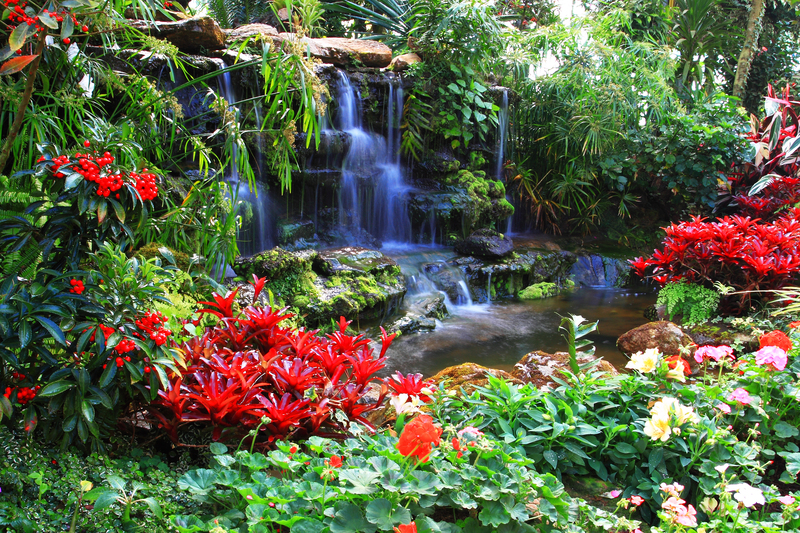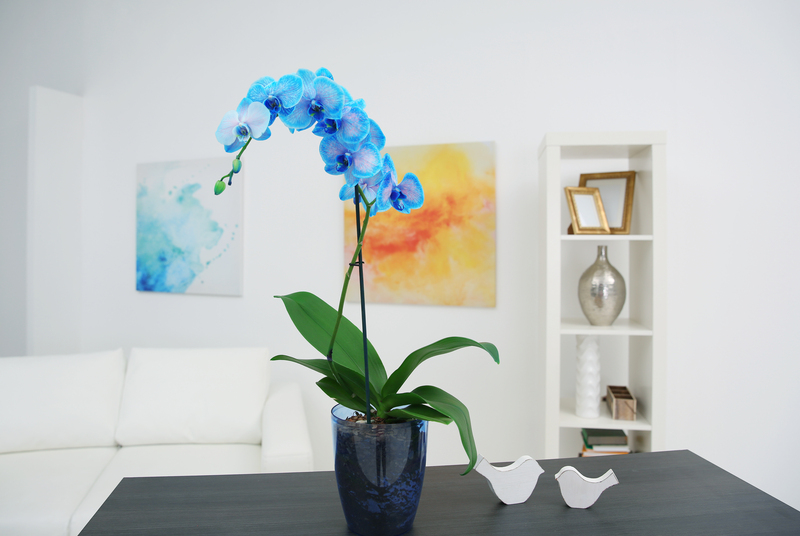Embark on your gardening adventure with these 9 key tips
Posted on 15/06/2025
Embark on Your Gardening Adventure With These 9 Key Tips
Whether you're a complete beginner or looking to refresh your green thumb skills, starting a gardening journey can be both exciting and rewarding. However, it's easy to feel overwhelmed by the sheer amount of information available. Fear not! With the right approach and practical advice, anyone can create a thriving garden. Embark on your gardening adventure with these 9 key tips designed to set you up for success and enjoyment in your own green oasis.
Why Start a Gardening Journey?
Gardening offers far more than just pretty flowers and fresh vegetables. It's an opportunity to:
- Reduce stress and promote relaxation
- Connect with nature and the outdoors
- Grow nutritious food right at home
- Create a beautiful environment for family and friends
By embracing your gardening adventure, you unlock these physical and mental health benefits, while also enjoying the satisfaction of nurturing living things.

9 Essential Tips to Embark on Your Successful Gardening Adventure
Let's dive into the most important advice for starting and nurturing your dream garden. Each tip will help you cultivate your gardening skills and avoid common pitfalls.
1. Understand Your Local Environment
Before planting a single seed, take time to observe and understand your local climate, soil, and sunlight patterns. Your climate zone vastly influences what plants will thrive.
- Check Your Hardiness Zone: This will guide you on which plants can survive year-round in your area. The USDA Plant Hardiness Zone Map is a handy tool.
- Soil Testing: Test your soil for pH and nutrient levels. Home testing kits or local extension services can assist.
- Sunlight Evaluation: Map which areas of your garden receive the most sunlight during the day, as different plants require varying light levels.
Knowing your environment helps you make informed decisions and increases your chances of growing a lush, healthy garden.
2. Choose the Right Gardening Style for You
The next step in your gardening adventure is matching your interests, space, and available time to a gardening method. Consider:
- Container Gardening: Ideal for patios, balconies, or renters.
- Raised Bed Gardening: Perfect for improved soil control and easier access.
- In-Ground Gardening: Suits those with more space and established yards.
- Vertical Gardening: Best for maximizing small urban spaces or adding decorative features.
Pick a style that fits your lifestyle--nothing is more discouraging than an overambitious project! *Start small* and scale up as your skills and enthusiasm grow.
3. Select Plants Wisely
This is one of the most vital decisions for beginners on their gardening adventure. Opt for easy-to-grow, resilient plants suited to your region:
- Vegetables: Lettuce, radishes, cherry tomatoes, beans, and herbs like basil are excellent starters.
- Flowers: Marigolds, sunflowers, calendula, and zinnias are tough and colorful choices.
- Perennials vs. Annuals: Perennials return yearly, offering lasting structure, while annuals bloom for one season but offer variety.
When visiting nurseries, ask for native plant suggestions. Native species often require less maintenance and attract pollinators.
4. Prepare the Soil for Success
Great gardens begin with healthy soil! Rich, well-draining soil gives plants the strong foundation they need. *Don't underestimate this step.*
- Amend with compost or well-rotted manure to boost fertility.
- Remove weeds and debris to minimize competition for nutrients.
- For clay or sandy soils, mix in organic matter to improve structure.
- Mulch around plants to conserve moisture and suppress weeds.
Embarking on a gardening adventure is far easier when your soil is primed for healthy, vigorous growth.
5. Master Proper Watering Techniques
Over- or under-watering are frequent stumbling blocks for new gardeners. Follow these tips to achieve the perfect balance:
- Check Soil Moisture: Stick your finger into the soil; water when the top inch feels dry.
- Water early in the morning or evening to reduce evaporation.
- Deep, infrequent watering encourages strong root systems.
- Avoid wetting the foliage, which helps prevent fungal diseases.
Different plants have unique watering needs--herbs often prefer to dry a bit, while vegetables may require deeper watering during fruiting.
6. Fertilize for Strong, Healthy Plants
Even with great soil, plants can sometimes need a nutritional boost to thrive. To nourish your garden properly:
- Research Plant Requirements: Leafy greens need more nitrogen, while flowering plants love phosphorous and potassium.
- Opt for *organic fertilizers* like fish emulsion, seaweed, bone meal, or homemade compost tea to supply nutrients naturally.
- Follow instructions to avoid over-fertilization, which can damage roots and hinder growth.
This simple habit will reward you with stronger, more resilient plants and bigger harvests as your gardening journey unfolds.
7. Learn to Identify and Manage Pests Naturally
Every gardener, beginner or expert, must deal with pests at some point. Before reaching for chemicals, try these eco-friendly practices:
- Encourage Beneficial Insects: Ladybugs, lacewings, and praying mantises are natural predators.
- Hand-pick visible pests, or use gentle sprays like soapy water for soft-bodied insects.
- Plant marigolds and nasturtiums to deter certain bugs.
- Practice Crop Rotation: This prevents the buildup of soil-borne pests and diseases.
Regular monitoring helps you catch problems early, so your plants remain healthy without upsetting the garden's ecosystem.
8. Keep a Garden Journal
This often-overlooked tip brings surprising benefits for gardeners at any level of experience. *Why keep a journal?* Because it helps you:
- Track what you plant, and where you plant it each season
- Record successes, pests, diseases, and weather patterns
- Plan crop rotations and improvements for the next year
- Celebrate milestones--such as your first tomato or blooming tulip!
A garden journal makes your gardening adventure more educational, organized, and satisfying. Plus, it's wonderful to look back and see how much you've grown--just like your plants.
9. Practice Patience and Enjoy the Process
The essence of any successful gardening adventure is recognizing that mistakes and unexpected outcomes are part of the journey. Plants grow at their own pace, and setbacks teach invaluable lessons.
- • Celebrate small victories, whether it's a single radish or a thriving flower bed.
- • Don't be afraid to ask for advice from nursery staff, neighbors, or local gardening clubs.
- • Experiment with new varieties and techniques each season.
Embarking on a gardening adventure is more about the journey than flawless results. With patience and curiosity, you'll grow in skill--and grow a beautiful garden, too.
Bonus Tips for Taking Your Gardening Adventure to the Next Level
Once you're comfortable with the basics, boost your gardening adventure further by exploring:
- Composting: Recycle kitchen scraps and garden waste to create nutrient-rich soil amendments.
- Seed Saving: Grow from seeds you've harvested to save money and preserve unique varieties.
- Attracting Pollinators: Plant lavender, bee balm, and native wildflowers to invite bees and butterflies.
- Drip Irrigation Systems: These can drastically cut down on your watering time and increase efficiency.
As you gain experience, your gardening adventure will continue to transform, offering new challenges and greater rewards each year.
Common Mistakes to Avoid in Your Gardening Journey
To truly thrive on your gardening adventure, steer clear of these typical pitfalls:
- Planting too much too soon: Avoid overwhelm by starting small and gradually expanding.
- Ignoring local advice and conditions instead of adapting to your specific environment.
- Neglecting regular care, watering, and observation.
- Using harsh chemicals instead of exploring natural solutions.
- Forgetting to label seeds and plants, making future identification difficult!

Frequently Asked Questions on Embarking on a Gardening Adventure
What are the easiest plants for beginners?
Lettuce, radishes, beans, sunflowers, and herbs such as basil and parsley are forgiving and provide quick rewards for new gardeners.
Can I start gardening if I only have a balcony?
Absolutely! Container gardening is perfect for balconies, decks, or windowsills. Choose compact varieties and pay close attention to watering and sunlight.
How can I garden organically as a beginner?
Use compost, mulch, and natural pest deterrents. Embrace native plants and pollinator-friendly flowers to strengthen your garden's ecosystem.
What are some tools every beginner gardener needs?
Start with basic tools: hand trowel, pruners, watering can or hose, gloves, spade, and a sturdy rake. As your needs grow, so can your tool kit.
Ready to Embark on Your Gardening Adventure?
There's never been a better time to start your gardening journey. With these nine key tips, you'll be ready to nurture your plants, expand your knowledge, and create a garden that brings joy year after year. Remember, every gardener was once a beginner--so lace up your boots, step outside, and embark on your gardening adventure today!
May your garden flourish, your harvests be bountiful, and your love of gardening grow with every season.
Related Articles & Resources:
- How to Start a Vegetable Garden From Scratch
- 10 Flowers That Attract Pollinators to Your Garden
- Beginner's Guide to Composting at Home
Latest Posts
How to Create a Vibrant Garden Paradise for Kids
Gardening Essentials for Every Open-Air Lover
Elevate Your Garden Aesthetics with These 9 UK-Friendly Ground Cover Plants

